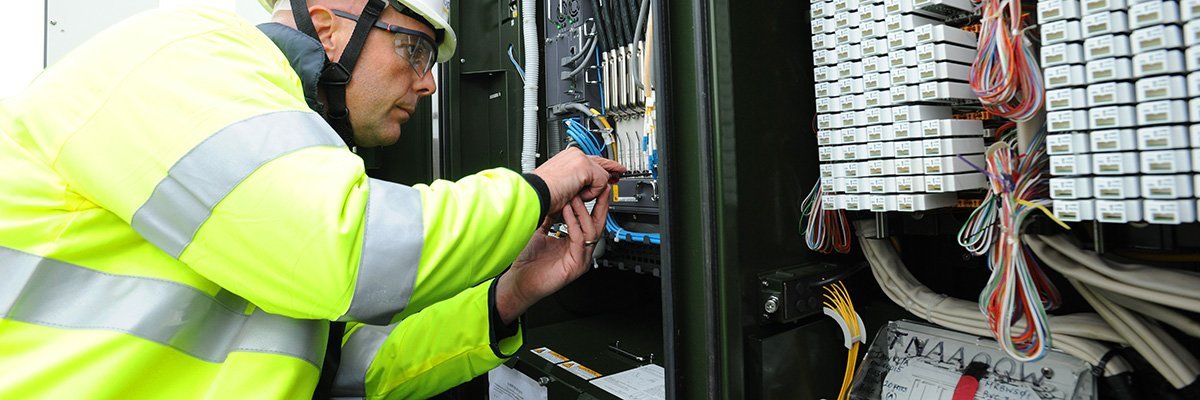The fears of many in the UK in March that the nation’s broadband infrastructure would collapse through the extra strain of those working from home has proven, six month later, to be just a fear. Research from UK communications regulator Ofcom has provided evidence that this was avoided during lockdown by the accelerated roll-out of fibre and superfast broadband.
Among the headline findings of the Connected Nations Update, which looked at connectivity up until the end of May 2020, were that full-fibre broadband roll-out has increased significantly to over 4.2 million homes (14%), up from 3.5 million (12%) since the latest review. Superfast and ultrafast broadband coverage is also continuing to expand across the UK, although to a lesser extent, rising by approximately 100,000 and 500,000 properties respectively.
While home broadband use and mobile calls traffic both saw significant increases as a result of changing working practices, mobile data use fell as people used their home Wi-Fi to access content on their smartphones. Mobile coverage remained stable.
Drilling down deeper, full-fibre coverage benefited from the activities of the major broadband providers and the altnets during the research period of the key players in extending gigabit services throughout the country.
Indeed, the UK government has committed to delivering nationwide gigabit-capable broadband as soon as possible, with the ambition to deliver it by over the next five years. It said such next-generation connectivity has the potential to revolutionise communities and make them more attractive places to live, giving people the freedom to live and work more flexibly and help to develop thriving digital economies.
In the Queen’s Speech on 19 December 2019, prime minister Boris Johnson’s then newly elected government indicated that it would introduce laws to accelerate the delivery of gigabit-capable broadband across the UK by 2025, a legislative journey that began in January 2020. The 2020 Budget statement confirmed the UK government’s commitment to invest a total of £5bn to roll out full-fibre broadband across the country.
Ofcom found that availability of full-fibre broadband in the UK continues to improve at a rapid pace, with over 4.2 million homes (14%) now able to access faster, more reliable full-fibre services, an increase of 670,000 (two percentage points) since January. This is a result of increased roll-out both from the expansion of existing broadband networks as well as the inclusion in its analysis of companies building entirely new fibre networks.
In the study period, despite Covid-19 curtailing home installations since March, the three broadband majors – BT (through its Openreach broadband provisioning arm), Virgin Media and CityFibre – have continued their full-fibre roll-outs apace; as has the altnet community, with companies such as Truespeed laying fibre in towns such as Wells in Somerset.
Yet for ultrafast broadband, defined as offering download speeds of at least 300 Mbps, availability was found to have increased across the UK by just under 500,000 properties since the spring update, to 16.6 million homes (57%).
This said, Ofcom has been driven predominantly by increases in the availability of both Virgin Media’s cable network and full-fibre deployments. In some, predominantly urban areas, new fibre networks were being deployed in areas with existing ultrafast coverage, and so the increases in full-fibre availability did not necessarily result in a corresponding increase of ultrafast coverage.
In the third category, superfast broadband, with download speeds of at least 30 Mbps, rolled out across the UK to an additional 100,000 properties covered since the last report. This meant a total of 27.8 million homes (95%) can now access superfast broadband.
Ofcom defines ‘decent’ broadband as 10Mbps download and 1Mbps upload speed, and noted that the vast majority of UK properties can now access decent broadband.
It added that the number of residential and commercial properties that cannot receive a ‘decent’ broadband service from a fixed line stands at 590,000 (2%), broadly similar to the 608,000 reported in April. The regulator believes that these properties may be eligible for the broadband universal service, which gives properties unable to get a decent connection the legal right to request one.
Ofcom also expected that the growing availability of Fixed Wireless Access (FWA) will further reduce the number of premises unable to get a decent broadband connection. In its last calculation in December 2019, Ofcom estimated that the number of properties unable to get decent broadband, even with the inclusion of FWA networks, was around 189,000.











/https://specials-images.forbesimg.com/imageserve/5f4ec4d8b1fb30d56efeff4c/0x0.jpg)

